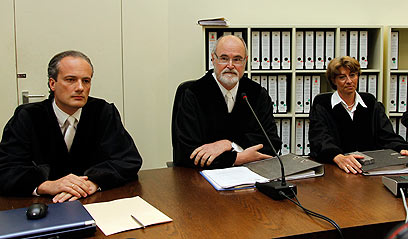

A German court sentenced John Demjanjuk to five years in prison on Thursday for his role in the killing of 27,900 Jews at the Nazi death camp Sobibor.
His lawyers will appeal the verdict.
The Munich court found the 91-year-old guilty of being an accessory to mass murder as a guard at Sobibor camp in Poland during World War Two.
Demjanjuk had been exonerated in a separate Holocaust trial two decades ago in Israel, where he was initially sentenced to death for being the notorious "Ivan the Terrible" camp guard at Treblinka in Poland. The ruling was overturned by Israel's supreme court after new evidence exonerated him.
Ukraine-born Demjanjuk, who was once top of the Simon Wiesenthal Center's list of most wanted Nazi war criminals, said he was drafted into the Soviet army in 1941 then taken prisoner of war by the Germans.
Demjanjuk attended the 18-month court proceedings in Munich - birthplace of Adolf Hitler's Nazi movement - in a wheelchair and sometimes lying down, with his family trying to argue that he was too frail to stand trial.

Demjanjuk enters cout (Photo: Reuters)
His son, John Demjanjuk Jr., said in an e-mail ahead of the verdict that his father was a victim of the Nazis and of post-war Germany.
"While those who refuse to accept that reality may take satisfaction from this event, nothing the Munich court can do will atone for the suffering Germany has perpetrated upon him to this day," he said.
No witnesses
Prosecutors had faced several hurdles in proving Demjanjuk's guilt, with no surviving witnesses to his crimes and heavy reliance on wartime documents, namely a Nazi ID card that defense attorneys said was a fake made by the Soviets.

Panel of judges (Photo: AP)
Guards at Nazi death camps like Sobibor were essential to the mass killing of Jews because extermination was the focus of such camps, prosecutors said. Some 250,000 Jews were killed at Sobibor, according to the Wiesenthal Center.
Defense attorney Ulrich Busch told the Munich court on Wednesday that even if Demjanjuk did become a prison guard, he did so only because as a prisoner of war he would have either been shot by the Nazis or died of starvation.
Demjanjuk emigrated to the United States in the early 1950s and became a naturalized citizen in 1958, working as an engine mechanic in Ohio.
'Justice, albeit late, finally served'
"I don’t think 'happy' is the right word," Retired Supreme Court Justice Dalia Dorner, who in 1988 presided over the Jerusalem District Court panel which determined that Demjanjuk was indeed "Ivan the Terrible."
"I said at the time that it was about serving justice, not about practical punitive aspects. It states that he is guilty. It is true that not everyone were brought to justice, but there is a feeling – for all of us – the eventually, justice caught up with him.
"Despite the fact the some evidence pointed to a doubt as to his identity, I personally had no doubt the he is Ivan the Terrible," she said.
Retired justice Zvi Tal was also unsurprised by the conviction, saying that at the time, the Supreme Court did not convict him for atrocities committed in Treblinka because there was a slight doubt as to his identity.
Still, Tal – as did Dorner – said there was never any doubt that Demjanjuk served in Sobibor. "He claimed that his service ID was a fake, but it was proven authentic. I am 100% certain he served in Treblinka, so for me, today's verdict is the case coming full circle. Justice was late, but at least it's been served."
Attorney Michael Horowitz, who served as one of the prosecutors during the Nazi criminal's trail in Israel, said: "I think justice has only been partially served, but better late than never."
'Conviction political'
But not everyone agrees that Demjanjuk's conviction indeed serves justice.
Attorney Yoram Sheftel, who served as Demjanjuk's defense attorney during his trial in Israel, called the Munich proceedings a 'farce,' and said that the conviction was driven by political motives.
The case, he stated, "Was settled in Israel in 1993, when the Supreme Court found him not guilty by reasonable doubt." According to Sheftel, in the 18 years since that verdict there has been no change in the evidence against Demjanjuk.
"The Israeli court's ruling should have been enough to prevent Germany from ever holding a trial."
Aviel Magnezi, AP and Reuters contributed this report
- Follow Ynetnews on Facebook















